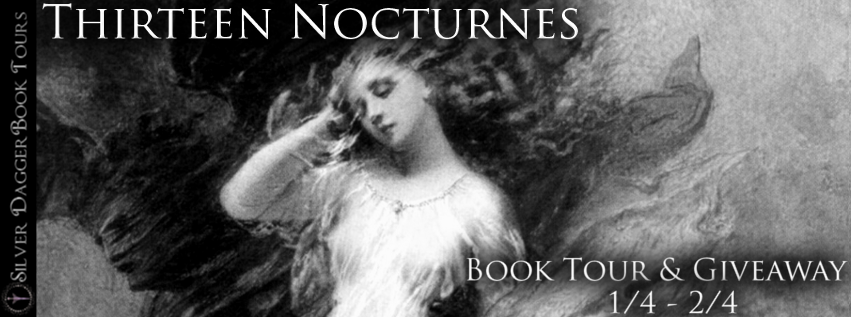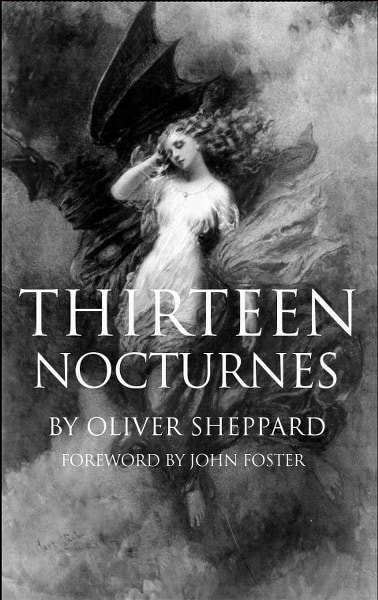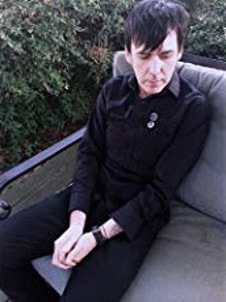Thirteen Nocturnes by Oliver Sheppard Book Tour and Giveaway :)
Thirteen
Nocturnes
by
Oliver Sheppard
Genre:
Gothic, Dark Poetry
Combining
lush Gothic lyricism with postmodern experimentation, Oliver
Sheppard's second collection of verse, Thirteen Nocturnes, presents a
nightmare vision of a world in the grip of apocalypse and shadow--a
world where "a nighttime of years never-ending" becomes "a
darkness severe and unbending," and where life is relentlessly
"gathered up against the towering shadow of decay." Taking
cues from the dark Romanticism of Poe, the decadent Symbolism of
Baudelaire, and the apocalyptic tradition of William Blake--as well
as the existential doominess of 20th century cosmic horror--Oliver
Sheppard's Thirteen Nocturnes presents a verse vision of collapse,
announcing a cold poetics of disintegration in the new dark age of
the Anthropocene.
"Reading
Sheppard's poetry is a little like listening to a conversation
between Nietzsche and William Blake during a showing of Peckinpah's
Cross of Iron. Using a wide range of forms and cultural references,
Sheppard illustrates the human condition in ways that take as much
account of its absence as its presence... Given the chance, Sheppard
will lead you down dark and unfamiliar paths, to moments of weird
beauty." --from the foreword by John Foster
And so of larger - Darknesses -
Those Evenings of the Brain
—DICKINSON
Darkness comes—the day does depart—
But darker still, the human heart.
Dark are night’s spaces,
Which we’ve peopled aptly:
Vampires, werewolves, witches, and ghouls.
In lightless places
The credulous raptly
Listen to fairy tales, trembling as fools.
So darkness deludes us; we’ve all played a part.
But darkest of all is the human heart.
Shadows of nation-state, shadows of blood—
Projections of fancy and causes of war.
Blaming the devil and his evil brood
Exonerates him who’s the war-machine’s whore.
Darkness finds power when daytime departs,
But darker environs are in human hearts.
Evil may be afoot on the earth—
And who is not guilty? Who stands apart?
Satan is blamed, for what it is worth;
Yet darkest of devils is the human heart.
Dark and cruel, the devil’s art—
Darker still, the human heart.
I am one of those people who loves gothic, horror, deep and dark places and anything surrounding it. Always have been so this book spoke to me, I just loved the poetry and the way it made me feel. Sometimes it's hard to understand what they are talking about - but as a student of literature, that is exactly what poetry is supposed to do - confuse you, make you think and come to your own conclusion. It's always open to interpretation. One of my favorite quotes from this book is "the starry rose-petaled demon ran his fingers along my skin, slicing me open to the world. Red carnations fell from my veins". Now other people might see it differently, but to me that says that my inner demons got hold of me and they made me open up and all of the bad things inside me were falling out like blood - the red carnations were the blood. But others may think of something totally different. I am a very deep person, I am an empath and so for me that means that things get to me more than they would other people. So you have to read this book to find your own interpretation, but that was mine.
The book itself draws on all of the darkest pieces of existence, it quotes the greatest gothic authors ever, such as Dickinson, which is one that most people would think of as a canon poet, but not many people really know how gothic she could be. My second quote I loved from this was "The shadow of Life is Death; and Death evinces his jealousy of Life through the phenomenon of disease." So from the day we are born we are already dying, some disease will take us, even if it's just a natural death like old age. And Death is always waiting for us, watching us, jealous that we are able to live longer than maybe Death wants us to. So Death in turn gives us diseases to get us sooner than we should be dying. Make sense? Maybe not, but I think if you read this you will start to get it and you will reach your own conclusions about the book and how it can relate to your own life. I know that each of us has a dark part to our life, sometimes facing that darkness is cleansing for our souls.
Over and above all of that, the book is a great read - it's short, and it does have some wonderful poetry quotations, it reminded me somewhat of Poe's works. Everything has a deeper meaning, and that deeper meaning is different for everyone. Check this book out, it's wonderfully gothic!!!
The book itself draws on all of the darkest pieces of existence, it quotes the greatest gothic authors ever, such as Dickinson, which is one that most people would think of as a canon poet, but not many people really know how gothic she could be. My second quote I loved from this was "The shadow of Life is Death; and Death evinces his jealousy of Life through the phenomenon of disease." So from the day we are born we are already dying, some disease will take us, even if it's just a natural death like old age. And Death is always waiting for us, watching us, jealous that we are able to live longer than maybe Death wants us to. So Death in turn gives us diseases to get us sooner than we should be dying. Make sense? Maybe not, but I think if you read this you will start to get it and you will reach your own conclusions about the book and how it can relate to your own life. I know that each of us has a dark part to our life, sometimes facing that darkness is cleansing for our souls.
Over and above all of that, the book is a great read - it's short, and it does have some wonderful poetry quotations, it reminded me somewhat of Poe's works. Everything has a deeper meaning, and that deeper meaning is different for everyone. Check this book out, it's wonderfully gothic!!!
Oliver
Sheppard was born in Nashville, Tennessee, and lives in Texas.
Critical reviews of his poetry collections have been kind: "Like
listening to a conversation between Nietzsche and William Blake while
watching Peckinpah's 'Cross of Iron'," reviews of his first
book, Destruction: Text I, claimed. Garnering accolades from academia
and punk zines alike, Sheppard's work takes cues from the cosmic
fatalism of Lovecraft and Thomas Ligotti, and combines that with the
lush, Gothic lyricism of the Dark Romanticist tradition.
"Sheppard's
THIRTEEN NOCTURNES is gothic in every sense of the word; from the
writing style, the themes, to Oliver's own influences. Without a
doubt, this bountiful collection raises the bar for contemporary
gothic poetry. It's rare in this day and age to find poetry written
in a manner as sophisticated and profound as this. But
here, Sheppard combines a down-to-earth modernism with older styles
that make for a fanciful and unique experience for the reader."--Sar
Blackthorn, CVLT Nation
NIGHT,
MELANCHOLY, AND THIRTEEN NOCTURNES
by
Oliver Sheppard
One
of Edgar Allan Poe's most poignant poems is the brief (and probably
unfinished) couplet that is usually reprinted under the title "Deep
in Earth." It reads:
Deep
in Earth my love is lying
And
I must weep alone.
--And
that, elegantly, is the poem's entirety.
Poe
wrote "Deep in Earth" in 1847 while mourning the death of
his young wife, Virginia Clemm. He scribbled the couplet in the
margins of a manuscript for "Eulalie," which may have been
one of Virginia's favorites of her newly widowed husband's works. Poe
always insisted that poets should write with an eye to what he called
"unity of effect"-- that is, that every poetic effort ought
ultimately to leave a distinct and singular impression--a uniquely
powerful effect--on the reader. Toward this end Poe felt that,
despite what classicists might say, or despite what readers might
think, longer poems were not necessarily more accomplished, more
literary, or the most successful in their designs. Bigger was not
always better. "Unity of effect" was usually achieved with
fewer lines, with lines honed and sharpened to cut right to the
reader's jugular.
But
the emotional gut-punch of Poe's "Deep in Earth" might have
less to do with the application of any high-minded literary theories
than with the raw emotion that is evident behind its words. Yet the
stark lines are a validation of Poe's "unity of effect"
ideal nonetheless. Before I get to one of my own attempts at
achieving such an effect in my new collection of verse, Thirteen
Nocturnes, I'd like to offer another poem that I think achieves a
forceful effect similar to that of Poe's "Deep in Earth"
above.
This poem is by Sara Teasdale, from 1915:
This poem is by Sara Teasdale, from 1915:
I
SHALL NOT CARE
by
Sara Teasdale
When
I am dead and over me bright April
Shakes
out her rain-drenched hair,
Tho'
you should lean above me broken-hearted,
I
shall not care.
I
shall have peace, as leafy trees are peaceful
When
rain bends down the bough,
And
I shall be more silent and cold-hearted
Than
you are now.
Eighteen
years after this poem was published Sara Teasdale took an overdose of
sleeping pills and ended her own life. An urban legend persists that
Teasdale wrote "I Shall Not Care" as her suicide note.
Teasdale
and Poe had issues with chronic major depression, something I and a
great many other poets have also struggled with. There are a variety
of influences that went into the composition of my book, Thirteen
Nocturnes, and I hesitate even now to say that my struggles with
depression have been an "influence" in the same way that,
say, the poetry of Baudelaire or Giacomo Leopardi have been
influences on me. But my own bouts of depression have added much of
the color to my verse, or have provided the impetus for it, and have
informed its tone, in some individual poems more than others. The
original idea behind Thirteen Nocturnes was to write a slim chapbook
of thirteen poems that were either meditations upon, or were odes to,
or had in some way been inspired by, the night. The project
snowballed and I confined the original thirteen poems to one section
of a five section collection of poetry, but I decided to keep
"Thirteen Nocturnes" as the title for the overall work.
Aiming
for a kind of unity of effect described above, I took pen to paper
and in one of the thirteen nocturnes I tried to describe my
decades-long battle with the sort of depression that William Styron
in Darkness Visible called "a storm indeed, but a storm of
murk":
NOCTURNE
No. 2
by
Oliver Sheppard
Night
was my vigil; I sat it alone,
A
nighttime of years never-ending,
Years
by myself where light was unknown,
The
darkness severe and unbending.
I
came upon means in my decades-long fight
To
only but briefly relieve it,
And
in certain moments I thought I'd found light
But
I was a fool to believe it.
Follow
the tour HERE
for exclusive excerpts, teasers and a giveaway!











Comments
Post a Comment